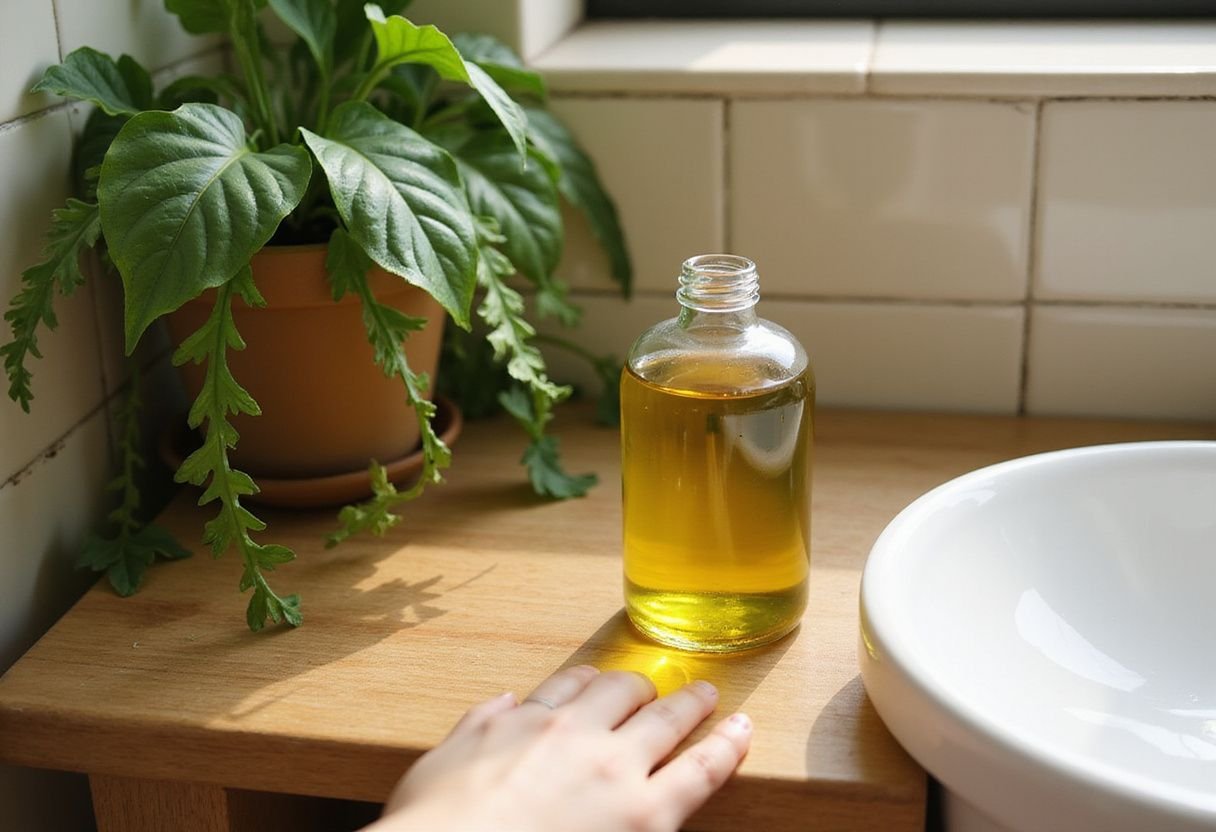Are you tired of seeing thin or weak hair in the mirror every morning? Many people feel this way, and it can be tough to grow thick, healthy hair. Science supports some great habits that really help, like using pumpkin seed oil for better hair density.
In this blog post, I will share five simple habits for thicker hair. You will find nutrition tips and easy scalp care routines along the way. There is hope for your own healthy hair journey.
Let’s start with the first habit!
Contents
- 1 Why Some People Have Thicker Hair Than Others
- 2 Habits for Thick, Healthy Hair
- 3 Scientifically Proven Ways to Get Thicker Hair
- 4 Conclusion
- 5 FAQs
- 5.1 1. What are the top habits for thick, healthy hair using science?
- 5.2 2. How does scalp health affect hair growth and thickness?
- 5.3 3. Can nutrition really help improve my hair health?
- 5.4 4. Should I use essential oils or other treatments to boost my hair restoration efforts?
- 5.5 5. Are there specific lifestyle habits that help maintain thick hair over time?
- 5.6 6. Do supplements make a difference in achieving thicker or denser locks?
Why Some People Have Thicker Hair Than Others
Some people have thick hair because of their genes. Hormones and age also play a big part in how thick our hair becomes.
GeneticsGenetics plays a big role in how thick my hair is. I know that some people are born with naturally dense hair, while others may have thinner strands due to their genes. Family traits can affect hair thickness and overall density.
Many times, the same hair type runs in families.
Hormones also come into play because they influence hair growth and health. Some changes in hormones happen with age, leading to different results for me compared to younger people.
To keep my hair healthy and thick, knowing these genetic factors is essential for my care routine.
Hormonal factors
Hormones play a big role in hair thickness. They can change due to different reasons, like age or health. Changes in hormones can affect how my hair grows. For example, conditions like polycystic ovary syndrome (PCOS) can lead to thinning hair for many women.
Certain vitamins help boost hormone levels that support healthy hair growth. I find that taking supplements with Omega-3, biotin, and zinc helps my hair stay strong. These nutrients work together to promote thicker strands.
Understanding these hormonal factors is key to having thick and healthy hair. Next, let’s explore habits I use for thick, healthy hair.
Age
Hormonal factors play a big role in hair health. Age also affects hair thickness. As I grow older, my hair may become thinner. This is normal for many people.
Hair density often changes with age. Some may notice thinning or slower growth after their 30s. Certain vitamins and nutrients can help too. Omega-3, zinc, and biotin are good for promoting hair growth at any age.
Keeping a healthy diet supports thicker hair as the years go by.
Habits for Thick, Healthy Hair
I love caring for my hair. I find simple habits keep it thick and healthy.
Nourish your body with a nutrient-rich diet
A nutrient-rich diet is key for thick, healthy hair. I focus on eating foods that boost hair growth. Certain vitamins and nutrients are very important for this. Omega-3 fatty acids, zinc, biotin, vitamin C, iron, and vitamin D can help my hair feel stronger.
These nutrients promote thicker hair and support overall hair health.
Protein intake plays a big role too. Hair is mostly made of protein called keratin. Eating enough protein keeps my hair dense and full of life. A well-balanced diet makes a real difference in my hair’s thickness and growth rate.
Proper nutrition creates the right environment for my scalp health to thrive; it prepares me to learn about the next step: focusing on scalp care through regular massage and proper cleaning.
Focus on scalp health through regular massage and proper cleaning
Nourishing my body with a nutrient-rich diet is just one part of a healthy hair routine. Focusing on scalp health is also very important. Regular scalp massages help blood flow to the hair follicles.
This can stimulate growth and make hair thicker over time.
Washing my hair properly matters too. I apply shampoo mainly on my scalp, not the entire length of my hair. This keeps dirt and oils in check while protecting the rest of my strands from drying out.
Using a thickening shampoo adds volume, making it easier to get that full look I want. Plus, I try to massage in essential oils like pumpkin seed oil because studies show they help promote denser hair for both men and women experiencing thinning or loss.
Keeping the scalp clean and using gentle products enhances overall health; this allows me to manage any buildup without irritation. Taking care of this area really makes a difference for achieving thick, healthy hair!
Minimize heat styling and tight hairstyles
Heat from styling tools can harm hair. I try to limit how often I use blow dryers, curling irons, and straighteners. These devices can make hair weak and damaged over time. Instead, I let my hair air dry whenever possible.
Tight hairstyles also strain the hair follicles. Styles like tight ponytails or braids may look nice but can cause breakage. Keeping styles loose helps reduce stress on my strands.
I notice that being gentle with my hair contributes to better growth and thickness. Scalp health improves when there’s less tension on the roots of my hair too.
Manage stress effectively
Minimizing heat styling and tight hairstyles helps protect my hair. Managing stress effectively is key for healthy hair too. Stress can lead to hair loss or thinning. I found that lifestyle changes can make a big difference.
To control stress, I practice relaxation techniques like deep breathing or yoga. Staying active boosts my mood and keeps me healthy overall. Good sleep also helps in managing stress levels well.
A calm mind supports scalp health, leading to thicker hair growth over time.
Be patient and gentle with your hair
Managing stress helps me stay calm, but being patient with my hair is just as important. Taking care of hair means treating it gently. I avoid tugging or pulling on it too hard when brushing or styling.
I have seen positive changes since I began giving myself scalp massages; they relax me and promote better blood flow to the scalp.
Washing often keeps my hair clean, but overdoing it can cause dryness. I only use shampoo on my scalp; this has helped maintain healthy hair without stripping moisture from the lengths.
Following a gentle routine makes a big difference for thick, healthy hair over time. By being so kind to my locks, I’ve noticed they feel stronger and look shinier.
Scientifically Proven Ways to Get Thicker Hair
You can try different methods to get thicker hair. Some treatments and products really work to improve hair growth and health.
Diet and supplements
Diet and supplements play a big role in hair thickness. I focus on eating foods rich in vitamins and nutrients. Omega-3, zinc, biotin, vitamin C, iron, and vitamin D are all great for hair growth.
These nutrients help those with thinning hair to see improvement.
Taking hair growth supplements can also be beneficial. Some people use pumpkin seed oil because studies show it helps make hair denser and thicker. Eating a well-balanced diet is key for healthy hair.
It truly makes a difference in how my hair looks and feels every day.
Scalp masks and treatments
Scalp masks and treatments can boost hair health. I often treat my scalp with natural oils. Pumpkin seed oil helped me notice thicker hair over time. It is known to help both men and women grow denser hair.
I also use deep-conditioning masks for my scalp. These masks keep the skin healthy and clean. They provide nutrients that support strong roots. Massaging the scalp while applying these treatments feels great too! Gentle pressure increases blood flow, which can encourage new growth.
Each treatment brings a little extra care to my hair care routine.
Microneedling
Scalp masks and treatments can help nurture my hair. Microneedling is another method that promotes thicker hair. This process uses tiny needles to create small punctures in the scalp.
It boosts blood flow and helps nutrients reach hair roots more effectively.
Studies show that microneedling can stimulate hair growth, especially for those with thinning hair. I learned that combining this technique with topical treatments further enhances results.
Users may see improved thickness and density over time when using a consistent routine of microneedling along with proper care methods.
Haircuts
Haircuts can help with hair growth and thickness. I learned that regular trims remove split ends and keep my hair looking healthy. I focus on getting a haircut every six to eight weeks.
This simple habit prevents damage from spreading.
Choosing the right hairstyle matters too. Some cuts can add volume to thin hair, making it look fuller. Using a thickening shampoo and conditioner after my haircut boosts the effects even more.
With time, these choices lead to healthier and thicker hair overall.
Shampoo and conditioning
Shampoo and conditioning are important for thick, healthy hair. I focus on using a thickening shampoo and conditioner to promote hair growth. These products can help achieve thicker hair over time.
Applying shampoo directly to the scalp is key for clean hair. It helps control oil without stripping the length of my hair. Conditioning is just as vital; it keeps hair smooth and adds moisture.
Several vitamins like biotin and Omega-3 support this process, aiding in overall health and thickness. Knowing my hair type also guides me in choosing the right products.
After caring for my scalp with proper shampooing and conditioning, I explore other methods for stimulating growth effectively.
Conclusion
Thick, healthy hair is possible with the right habits. I learned that a good diet and scalp care are key to growth. Gentle handling and lower heat help too. Simple changes can make a big difference over time.
With patience and the right routine, beautiful hair is within reach!
FAQs
1. What are the top habits for thick, healthy hair using science?
The best habits include a balanced hair care routine, proper scalp care, eating a nutrient-rich diet with enough protein intake, using essential oils or natural remedies, and choosing the right hair products for your hair type.
2. How does scalp health affect hair growth and thickness?
A clean and healthy scalp helps new hairs grow stronger. Good scalp care boosts blood flow to roots which supports better hair density.
3. Can nutrition really help improve my hair health?
Yes; eating foods rich in vitamins and protein helps support strong strands. A nutrient-rich diet can also prevent thinning by giving your body what it needs for healthy growth.
4. Should I use essential oils or other treatments to boost my hair restoration efforts?
Essential oils like rosemary or peppermint may help some people when used as part of their regular regimen. Always test first since not all natural remedies work for every person.
5. Are there specific lifestyle habits that help maintain thick hair over time?
Regular sleep, low stress levels, gentle handling during washing or brushing, and avoiding harsh chemicals all protect your strands from damage over time.
6. Do supplements make a difference in achieving thicker or denser locks?
Some people see benefits from certain supplements designed for hair growth but results vary by individual and depend on overall nutrition as well as consistent maintenance of good daily habits.

